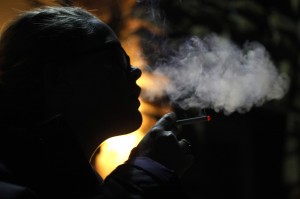The university known for an annual 4/20 smokeout will become smoke-free this week.
Chancellor Philip DiStefano is signing a policy banning smoking on the CU Boulder campus on or before Friday, according to university officials.
The policy will take effect immediately but will enter a soft launch or educational period through Aug. 8. The full ban will be enforced next fall.

CU will be going smoke free later this week when Chancellor DiStefano signs the policy banning smoking on campus. (Robert R. Denton/CU Independent Photo Illustration)
“Smoking presents a significant health hazard,” Louise Vale, vice chancellor for administration, said. “We have a responsibility to support and improve the health of all our students and faculty.”
The policy comes weeks after CU Student Government Legislative Council killed a bill on Dec. 6 that would have banned tobacco products from campus.
“A lot of people thought tobacco was an overreach, and smoke-free made more sense to protect people from second-hand smoke,” Chris Schaefbauer, CUSG Director of Health and Wellness and a PhD student studying healthcare, said.
Schaefbauer authored and supported the tobacco policy, but, as an executive-appointed member of student government, does not have a vote on Legislative Council. He has another chance to voice opinions as one of 11 members of a committee created to address implementation of the smoking policy.
The No Smoking Policy Implementation Committee includes two administrators, one of which is chair of the committee, vice chancellor Louise Vale; one faculty member; seven staff members and one student, Schaefbauer.
The committee will meet for the first time Monday morning and will discuss temporary designated smoking areas and educational outreach among other techniques for the soft launch this spring.
“They may be looking at different cessations for smoking on campus, developing an education and communication plan around smoking, looking at a phase-in approach,” Malinda Miller-Huey, assistant director of media relations and news services, said.
Although the agenda is not explicit, Schaefbauer said he does not believe implications of the smoking ban on 4/20 will be a topic of discussion.
“I’ve avoided conflating the issues because they are separate and is being handled right now as its own issue,” he said. “The campus already has a policy that dictates marijuana use.”
Fines will not be issued for smoking, Vale said. Enforcement will be “community-based,” and may also involve the Office of Student Conduct.
“Right now, if you’re caught walking behind a smoker, there’s really very little you can do about protecting your own health,” Shaefbauer said. “It’s a lot about empowering those people and getting them to speak up.”
Hossam Aldossary, 20, a junior electrical engineering major and avid smoker, said he has never been approached about his smoking by those around him. He said he feels there is adequate room, especially on the large campus, for people to avoid smoke.
Aldossary believes the policy will aggravate smokers, especially since the policy won’t go to a student vote, but that it could also lighten the number of butts custodians clean up every day.
“It will definitely decrease the amount of cigarettes someone smokes, if they really, really enforce it,” Aldossary said. “But to make them quit, no.”
He said he would sneak smokes if there is weak enforcement.
“I have the right to smoke,” Aldossary said.
Shari Beck, 31, a graduate student studying English, said that the student government at her alma mater, Kenyon College, decided to make the campus smoke-free in 2012.
“On my campus in undergrad it was split 50/50,” Beck said. “Half the students supported it and half the students didn’t.”
A community health and wellness review conducted by Wardenburg Health Center on campus found that 60 percent of students have never smoked, according to Miller-Huey. Still, determining how many students currently smoke or how many students oppose a ban has yet to be seen.
The last time the university came close to going smoke-free was in 2009, which hit a wall with changes in administration and financial shortcomings to launch the smoke-free campus initiative.
“There were shortfalls in state money, so the tobacco education funding wasn’t available then, and it is now,” Miller-Huey said.
The university will join about 1,130 college campuses in the nation that are smoke free, according to American Nonsmokers’ Rights Foundation.
Contact CU Independent Copy Editor Alison Noon at Alison.noon@colorado.edu.
